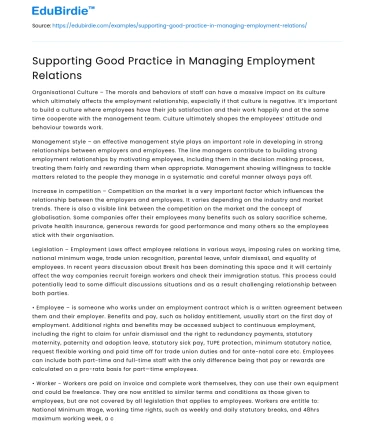Organisational Culture – The morals and behaviors of staff can have a massive impact on its culture which ultimately affects the employment relationship, especially if that culture is negative. It’s important to build a culture where employees have their job satisfaction and their work happily and at the same time cooperate with the management team. Culture ultimately shapes the employees’ attitude and behaviour towards work.
Management style – an effective management style plays an important role in developing in strong relationships between employers and employees. The line managers contribute to building strong employment relationships by motivating employees, including them in the decision making process, treating them fairly and rewarding them when appropriate. Management showing willingness to tackle matters related to the people they manage in a systematic and careful manner always pays off.
Save your time!
We can take care of your essay
- Proper editing and formatting
- Free revision, title page, and bibliography
- Flexible prices and money-back guarantee
Increase in competition – Competition on the market is a very important factor which influences the relationship between the employers and employees. It varies depending on the industry and market trends. There is also a visible link between the competition on the market and the concept of globalisation. Some companies offer their employees many benefits such as salary sacrifice scheme, private health insurance, generous rewards for good performance and many others so the employees stick with their organisation.
Legislation – Employment Laws affect employee relations in various ways, imposing rules on working time, national minimum wage, trade union recognition, parental leave, unfair dismissal, and equality of employees. In recent years discussion about Brexit has been dominating this space and it will certainly affect the way companies recruit foreign workers and check their immigration status. This process could potentially lead to some difficult discussions situations and as a result challenging relationship between both parties.
• Employee – is someone who works under an employment contract which is a written agreement between them and their employer. Benefits and pay, such as holiday entitlement, usually start on the first day of employment. Additional rights and benefits may be accessed subject to continuous employment, including the right to claim for unfair dismissal and the right to redundancy payments, statutory maternity, paternity and adoption leave, statutory sick pay, TUPE protection, minimum statutory notice, request flexible working and paid time off for trade union duties and for ante-natal care etc. Employees can include both part-time and full-time staff with the only difference being that pay or rewards are calculated on a pro-rata basis for part—time employees.
• Worker - Workers are paid on invoice and complete work themselves, they can use their own equipment and could be freelance. They are now entitled to similar terms and conditions as those given to employees, but are not covered by all legislation that applies to employees. Workers are entitle to: National Minimum Wage, working time rights, such as weekly and daily statutory breaks, and 48hrs maximum working week, a companion during disciplinary hearing, protection from discrimination, health & safety protection, paid annual leave etc.
• Self –employed - Someone who is self-employed contracts their service; they set their own hours of work and have no right to expect work. Their contract is for service, not for time and they are not subject to disciplinary procedures. Self-employed workers aren’t paid through PAYE, and they don’t have the employment rights and responsibilities of employees.
“Someone can be both employed and self-employed at the same time, for example if they work for an employer during the day and run their own business in the evenings.”
It’s important to underline here the concept of mutual obligation in relation to a contact of service. Simply, it’s an obligation on the worker to work and an obligation on the employer to pay him and to continue to make work available during the time of the contract.
Identify and analyse for the employer why it is important to determine the employment status for individuals working at the park (give 2 examples)
Employment status matters a great deal for the individuals in understanding their rights and for employers in understanding their obligations to those individuals. The correct identification and understanding of an individual’s status can influence their approach to the whole working relationship.
For instance, an “employee” will be protected against unfair dismissal, he/she will be entitled to a redundancy payment, and is entitled to receive notice from the employer before being dismissed from the job. Additionally, an employee is entitled to the minimum wage payable according to national legislation and their working hours are governed under provisions of the working time regulations. They are also protected against any form of discrimination.
In contrast, if one of the “workers” from the farm was sick, he would be entitled to be paid statutory sick pay. However, he wouldn’t be entitled to statutory redundancy payment if things didn’t work well at the farm, and some redundancies were planned.
If a farm needed a tractor driver to provide a tractor ride service for children over the summer he could be self-employed in this case, bringing his own tractor and only providing a service for the farm. If he didn’t turn up he could have his contract terminated without the need to go through the disciplinary procedures.






 Stuck on your essay?
Stuck on your essay?

